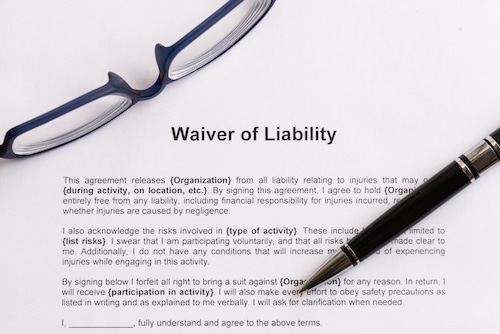
There are a number of situations a person could encounter in which they are required to sign a liability waiver. Many people sign them without looking closely at them or thinking about what they would do if they were injured. Keep reading to learn the facts about liability waivers and how they can impact your right to file a personal injury lawsuit.
Am I Required to Sign a Liability Waiver?
It is common for a business to require customers or clients to sign a waiver that they cannot be sued for risks the client or customer is taking. While you are not likely legally required to sign the waiver, it is likely that the company in question will not allow you to take part in what they are offering if you do not sign the waiver.
What’s the Difference Between Ordinary and Gross Negligence?
If you sign a waiver and are injured, whether or not you have a right to sue will depend largely on whether the injury was the result of ordinary or gross negligence. Ordinary negligence is failing to provide reasonable care to prevent someone from harm. Gross negligence is defined as a significant departure from the care a reasonable person would provide in the same situation.
Consider this example: An employee at a local rec center does the rounds but does not notice that there is a bolt loose on a piece of dangerous equipment. This is likely ordinary negligence and would be covered by a waiver someone signed to use the rec center. On the other hand, if the employee saw the missing bolt and declined to take action, this could be considered gross negligence and the waiver might not be applicable.
Are Liability Waivers Always Enforceable in California?
No. They are enforceable to the extent that the customer takes on the risk of ordinary negligence. California law is clear that liability waivers cannot be used as an excuse for an injury that involved gross negligence, intentionally wrong acts, or recklessness.
Liability waivers must also be written in accordance with state and federal laws. If they are not, then they might not be enforceable. Finally, the law requires that the liability is clear, explicit, and unambiguous. For example, if they are written in tiny font, or are hidden deep within a document, they might not be enforceable.
Should I Sign a Liability Waiver?
There are too many variables in different situations for us to give you a clear yes or no. If you are going to sign, do your homework. Research the company to see if there have been safety allegations made against them. Ask to examine the property you will be on or the equipment you will be using. Do not blindly sign a waiver without understanding what it says, and if you are injured even after signing it, contact a personal injury attorney to find out what your options are.



